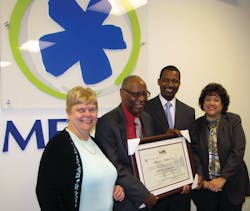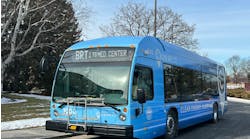William L. Mallory, Sr. is leaving the Southwest Ohio Regional Transit Authority’s board of trustees after six years of service. SORTA operates Metro and Access public transportation services in Greater Cincinnati.
Mallory has served on the SORTA board since 2006. He served as vice chair of the board from January 2008 through December 2010. He also served as chair of the Budget Committee and a member of the Operations & Management, Diversity, Nominating, Planning & Development, Executive, Issues, and Compensation committees.
“William Mallory is a true leader, and I have been honored to serve with him on the SORTA board,” said Sean Rugless, SORTA’s chairman. “Mr. Mallory’s contributions to public transportation have been far-reaching. From his involvement with the creation of Metro almost 40 years ago to his most recent role as a SORTA trustee, he has served the public well. His experience, wisdom and counsel will be missed.”
In recent years, Mallory has been engaged in numerous causes. He founded the Mallory Center for Community Development, a non-profit agency in Cincinnati. He received an award from the Department of Aging honoring his work establishing the Commission on Aging. Mallory also serves on the Ohio Elections Commission and has been recently appointed to the board of the YMCA of Greater Cincinnati.
Before his retirement, Mallory served as a member of the Ohio House of Representatives for 28 years. He was the first African-American majority floor leader and the first African-American to preside over a session as speaker of the House. Mallory retired in 1994 holding the record as the longest serving majority leader in Ohio's history and the longest serving Ohio House representative from Hamilton County.
In Cincinnati, Mallory played a major role in the creation of Metro, Cincinnati’s publicly owned transit system, by serving as co-chairman of the Citizen's Transportation Committee. He worked to create the Cincinnati Human Relations Commission and Cincinnati’s first community housing development corporation. Mallory also created Ohio’s nationally recognized drug prevention program, the Urban Minority Alcoholism-Drug Outreach Program.
On the national level, Mallory was appointed to the National Highway Safety Advisory Committee by President Carter and to the International Trade Advisory Committee by President Clinton.
Mallory's accomplishments include serving as chairman of the House Select Committee on Technology and as vice-chairman of the House Select Committee on Health Care Reform. He has been co-chairman of the Hamilton County Democratic Party and president of the Black Elected Democrats of Ohio.
Mallory has won numerous awards for his support of education, senior citizens, public transportation, mental health, and American Civil Liberties issues, including the City Manager's award for his contributions to the city of Cincinnati, the National Conference of State Legislatures’ Award for Leadership, and the Martin Luther King Dream Keeper Award.
Mallory also received the YMCA’s Strong Communities Award, Cincinnati African-American Firefighters Association/Sentinels Police Association’s Cincinnati Trailblazer Award, and the Most Influential 50 Blacks (1953-2003) Making A Difference in the Community Award from WCIN and Fifth Third Bank.
Mallory is a graduate of Central State University, which awarded him the first honorary doctorate of laws given to an alumnus. He pursued post-graduate studies at Xavier University. A former Cincinnati Public Schools teacher, Mallory also taught courses at the University of Cincinnati in state government and African-American politics since the Civil War for 25 years.
Mallory is a Cincinnati native and resident. He is married and has six children.
Metro and Access are non-profit public services of the Southwest Ohio Regional Transit Authority, providing almost 17 million rides per year in the Greater Cincinnati community.



